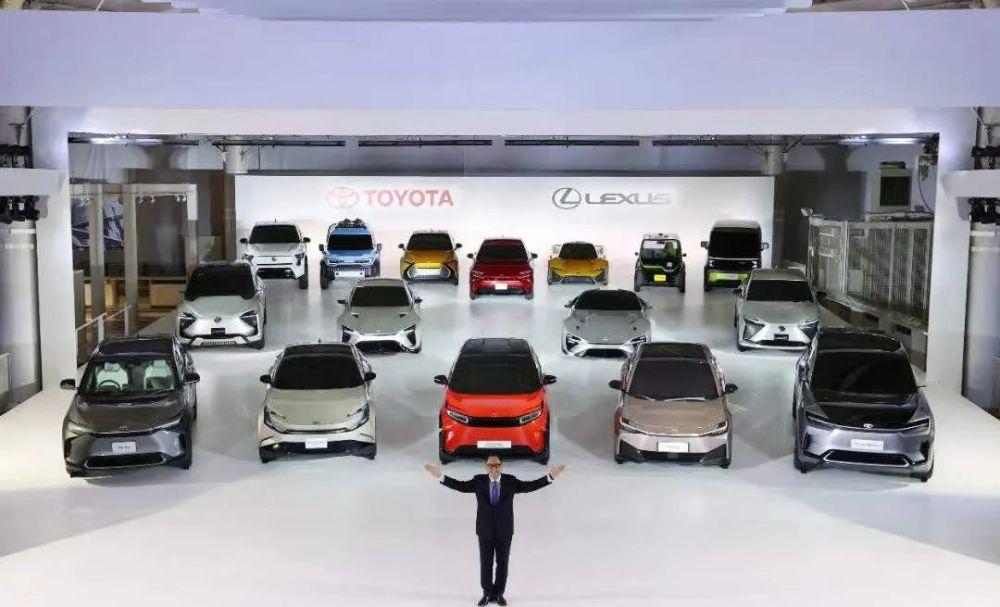With Honda and Nissan successively announcing their future development plans for electrification, Toyota, as the largest "volume" of Japanese brands, finally "can't wait" to show its determination to accelerate the transformation of electric power to the outside world.

On December 14, Toyota Motor held an online electrification strategy conference, announcing that it will launch 30 electric vehicles worldwide by 2030. In this 8 trillion yen ($70 billion) electrification transformation strategy, half of the funds will be used to develop all-electric models.
16 pure electric concept cars were unveiled first
As another "highlight" of this conference, the appearance of 16 pure electric concept cars has made Toyota's "drama code" earn enough eyeballs. Among them, in addition to the new electric vehicles of the new sub-brand bZ, there are also Toyota and Lexus concept cars with the same frame.
Among the new cars unveiled this time, it covers a variety of models including cars, SUVs, MPVs, pickup trucks, K-Cars, sports cars, etc., covering all product areas of Toyota. Among them, the bZ brand involves 5 models.
According to previous planning, Toyota had planned to build a number of pure electric vehicles based on the e-TNGA architecture by 2025, including 3 SUVs, 1 station wagon and 2 MPV models, and the new cars will be named in the way of bZ+ numbers, of which bZ means "Beyond Zero", that is, a vehicle with zero exhaust emissions.
In addition to the bZ4X, which was unveiled at this year's Shanghai Auto Show and Guangzhou Auto Show and will be launched in early 2022, the bZ Compact SUV concept car designed in a cross-border style and the bZ Large SUV concept car positioned as a medium-sized SUV have attracted a lot of attention. At the same time, the mid-size sedan bZ SDN concept car and the small SUV model bZ Small Crossover concept car are also unforgettable.
In addition, Lexus also officially released four new electric vehicles at the conference. Among them, Electrified SUV, Electrified Sedan and Electrified Sport correspond to three types of SUVs, sedans and sports cars, respectively. Compared with these three concept cars, the Lexus RZ, which has previously released the trailer, has also unveiled its mystery, and it is reported that the Lexus RZ will officially debut in 2022.
Electric vehicle sales are aimed at a new target of 3.5 million
At this stage, Toyota Motor has introduced about 100 models in more than 170 countries and regions around the world, including fuel vehicles, hybrid vehicles, plug-in rechargeable hybrid vehicles and hydrogen fuel cell vehicles. The Lexus brand has also introduced about 30 models in more than 90 countries and regions.
Toyota Motor President Akio Toyoda said: "We live in an era where there are no standard answers. In a diverse world, people's needs are also different, and it is difficult to make everyone happy through a single choice. So Toyota wants to offer as many choices as possible to consumers around the world. ”
At the press conference, Toyota announced that it will continue to expand the selection of "carbon-neutral models" by introducing more pure electric models. It is expected that by 2030, the global annual sales of pure electric models can reach 3.5 million units, accounting for about one-third of its current car sales.
But while the figure of 3.5 million units sold a year may seem like a lot, it's still a bit conservative for competitors like Volkswagen. According to forecasts released by volkswagen group in July, by 2030, half of its global car sales will be electric vehicles.
For Lexus, Akio Toyoda hopes to achieve a full range of product lineups for all models of the brand to provide pure electric versions by 2030, and reach the goal of selling 1 million units worldwide. By 2035, we will achieve 100% global sales of all-electric models.
In addition, Toyota plans to promote the application of fuel cell vehicles in areas such as buses and large trucks. In the future, Toyota will increase its new investment in batteries from 1.5 trillion yen announced in September to 2 trillion yen, and expects to achieve more advanced, higher quality and more competitive batteries.
summary:
Although compared with Japanese brands or European car companies, Toyota's electrification strategy is not too early. But a complete system and firm confidence are enough for Toyota to find its own position. With the successive launch of bZ brand models and the first transformation of Lexus, Toyota will also return to the mainstream track of electrification while opening a new era of electrification.